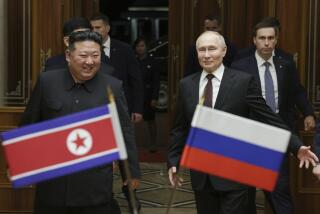BRIEFING TODAY’S TALKS : Another Move on Chessboard: Meeting Roh
SAN FRANCISCO — Today, on the final day of his American tour, Soviet President Mikhail S. Gorbachev will make one last grand move on the global chessboard by meeting here with the president of South Korea, Roh Tae Woo.
Both the economic and political aspects of the meeting with Roh could be of crucial importance to the two countries involved. For the Bush Administration, which helped arrange the meeting, better relations between the Soviets and the South Koreans could offer several major advantages.
Relations between the two nations have been hostile since South Korea’s creation at the end of World War II. At that time, the Soviet and American armies divided the Korean Peninsula between them. As happened in Germany, the two occupation zones evolved into two separate countries--a capitalistic south and communistic north.
Relations went from hostile to bitter in the wake of the Korean War, in which North Korea’s army, backed by the Soviets and Chinese, almost overran the south before being pushed back by South Korean and American troops.
Over the last year, however, relations have begun to thaw, with today’s meeting marking a major step in that warming process.
Economics
For South Korea, the Soviet Union offers a potentially huge market for both consumer goods and labor. Korean business leaders are hoping to get entree to the Soviet economy before their rivals in Japan do. Japanese-Soviet relations remain tense because of territory the Soviets seized at the end of the war--land that the Japanese still want back.
For the Soviets, Korea represents a potential source of badly needed, often inexpensive, consumer goods and even more badly needed investment capital. One major question about today’s meeting will be how much aid Roh is prepared to offer Gorbachev.
Politics
Roh may be prepared to offer a lot because better relations with the Soviets will help him outflank North Korea, whose armies the South Koreans regard as an ever-present threat.
For years, North Korea has prospered militarily from the rivalry between the Soviets and China, playing one Communist power against the other and extracting military aid from both. Good relations between South Korea and the Soviets could cut off the flow of Soviet aid to the North Koreans.
For the Soviets, meanwhile, better ties with Korea could help prod the Japanese into improving their relations with Moscow to avoid being left behind.
U.S. Position
For the Administration, virtually any improvement in Soviet-South Korean relations would be a major plus. Korean economic aid could further Washington’s objective of strengthening Gorbachev’s position at home.
At the same time, reduced Soviet military aid to North Korea would ease the way for a withdrawal of some American troops from Korea--a move welcome in a time of shrinking defense budgets.
More to Read
Sign up for Essential California
The most important California stories and recommendations in your inbox every morning.
You may occasionally receive promotional content from the Los Angeles Times.











